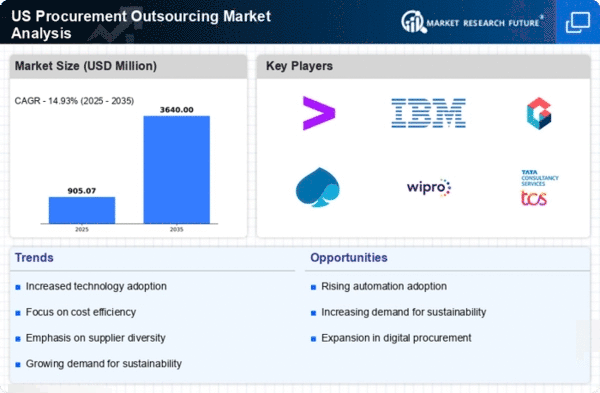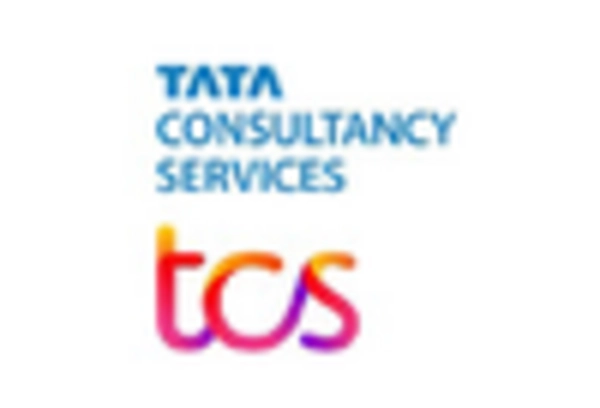Focus on Core Competencies
In the procurement outsourcing market, a notable driver is the increasing emphasis on core competencies. Organizations are recognizing the importance of concentrating on their primary business functions while outsourcing non-core activities, such as procurement. This strategic shift allows companies to allocate resources more effectively and enhance their competitive advantage. By outsourcing procurement, firms can benefit from specialized expertise and advanced technologies that they may not possess in-house. This trend is particularly relevant in sectors like technology and healthcare, where rapid innovation is crucial. As businesses strive to improve operational efficiency and focus on their strengths, the procurement outsourcing market is poised for growth, reflecting this strategic realignment.
Cost Efficiency and Savings
The procurement outsourcing market is increasingly driven by the need for cost efficiency and savings. Organizations are recognizing that outsourcing procurement functions can lead to substantial reductions in operational costs. By leveraging external expertise, companies can streamline their procurement processes, reduce overhead, and achieve better pricing through bulk purchasing. According to recent data, businesses that engage in procurement outsourcing can save up to 30% on procurement costs. This trend is particularly evident in industries such as manufacturing and retail, where cost control is paramount. As companies continue to seek ways to enhance their bottom line, the procurement outsourcing market is likely to experience significant growth, driven by the pursuit of financial efficiency.
Global Supply Chain Dynamics
The dynamics of The procurement outsourcing market. As companies expand their operations internationally, they face challenges related to sourcing, logistics, and supplier management. Outsourcing procurement functions allows organizations to navigate these complexities more effectively. By partnering with specialized firms, businesses can gain access to a broader network of suppliers and enhance their sourcing capabilities. This is especially relevant in industries such as automotive and electronics, where global supply chains are integral to success. As companies seek to optimize their supply chain strategies, the procurement outsourcing market is likely to grow, reflecting the need for agility and responsiveness in a rapidly changing global landscape.
Regulatory Compliance and Risk Management
The procurement outsourcing market is significantly influenced by the increasing complexity of regulatory compliance and risk management. Organizations face a myriad of regulations that govern procurement practices, and failure to comply can result in severe penalties. Outsourcing procurement functions allows companies to leverage the expertise of specialized firms that are well-versed in compliance requirements. This is particularly critical in industries such as pharmaceuticals and finance, where regulatory scrutiny is intense. Furthermore, outsourcing can mitigate risks associated with supply chain disruptions and vendor management. As businesses navigate these challenges, the procurement outsourcing market is likely to expand, driven by the need for effective compliance and risk management strategies.
Technological Advancements in Procurement
Technological advancements are a key driver in the procurement outsourcing market. The integration of advanced technologies such as artificial intelligence, machine learning, and data analytics is transforming procurement processes. These technologies enable organizations to make data-driven decisions, optimize supplier selection, and enhance overall procurement efficiency. For instance, companies utilizing AI-driven procurement solutions can achieve up to 20% improvements in procurement cycle times. As businesses increasingly adopt these technologies, the demand for procurement outsourcing services is expected to rise. This trend is particularly pronounced in sectors like retail and manufacturing, where technology plays a pivotal role in enhancing operational efficiency and competitiveness.
















